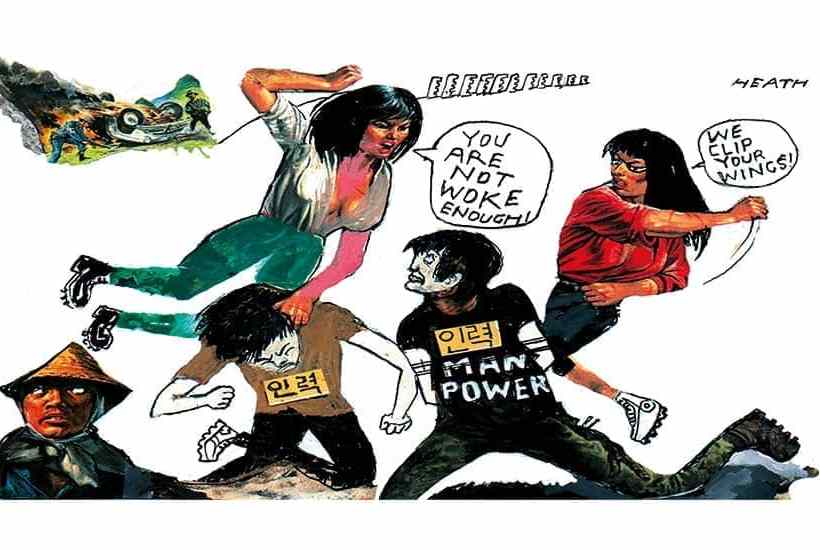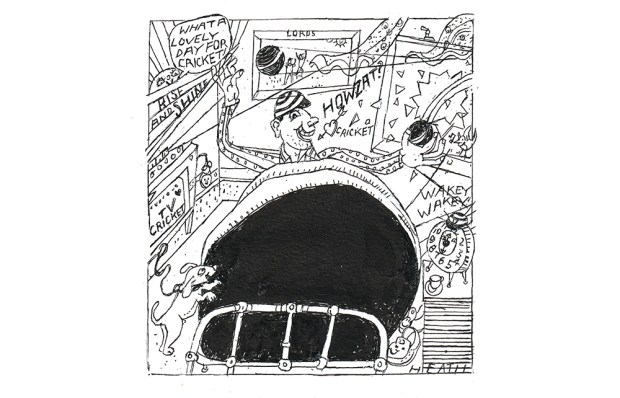The two leading candidates for South Korea’s presidential election in March, Lee Jae-myung of the incumbent Democratic party and Yoon Suk-yeol of the conservative People Power party, have both made men’s rights central to their campaigns. They hope to appeal to the growing constituency of outraged men’s groups who vent their frustration at feminist overreach on internet message boards and sometimes even protest on the streets. And this is no fringe community: in a poll in May, more than three-quarters of South Korean men in their twenties claimed they had suffered gender discrimination.
The ostensible provocation for this anger is the outgoing president Moon Jae-in’s self-declared ‘feminist’ administration. The initiatives of the Gender Equality Ministry include start-up loans for female entrepreneurs, incentives to businesses to promote a gender balance on their boards and a pledge to allocate 30 per cent of cabinet posts to women.
All that may seem unremarkable in the ‘progressive’ West, but it jars horribly in still-traditional South Korea. The country has one of the world’s toughest merit-based education systems which puts children through a punishing regime of tests, cram schools and witheringly frank report cards. To go through that hell and learn you could be passed over for a decent job because of your sex has clearly driven some men beyond endurance. And this is in a country where many men feel disadvantaged by their two years of compulsory military service.
Yoon has been the more vociferous of the two candidates. In a recent Facebook post he called for the abolition of the Gender Equality Ministry: his original position was just to reform it. He has also pledged to increase the wages of enlisted soldiers and to undo policies that push preferential treatment for women.
Lee Jae-myung, once dubbed South Korea’s Bernie Sanders, has also criticised the Gender Equality Ministry, accusing it of promoting reverse discrimination and victimising men. He doesn’t go as far as to say he would abolish the ministry; instead he would retain it in a limited form. He is attempting to woo disaffected young men struggling to find work or get a home with promises of universal basic income and a house-building drive. He may need to strengthen his position, though, as Yoon’s uncompromising stance has seen him draw level in a recent poll, and he’s well ahead with young voters. Another recent survey showed 52 per cent of Koreans agree with Yoon about scrapping the ministry.
The debate has at times broadened from criticism of an allegedly dysfunctional government department into straightforward anti-feminism. In August, Yoon ascribed the country’s low birth rate to misandry, stating that feminism ‘is so politically abused that it acts as an emotional barrier to healthy relationships between men and women’. In November, Lee shared an anonymous letter from an online community arguing that the ‘madness’ of feminism had to be stopped.
There have been some rather farcical provocations in the media which have increased tensions and show just how febrile the sexism debate has become. TV ads for South Korea’s largest convenience store chain, GS25, the bank group Kakao and the fried chicken outlet Genesis BBQ featured images of cartoon hands with the index finger touching the thumb, the symbol of a formerly powerful radical feminist group (and code, apparently, for a small penis). The companies all withdrew advertising material after public outcry. Even the Seoul police were criticised for featuring the gesture on a road sign.
Then there was a controversy over a joke by a female comedian called Park Na-rae. In a YouTube video she directed the hands of a Stretch Armstrong action figure towards his groin. This absurdly trivial act provoked howls of criticism that a similar joke by a male comedian would not have been tolerated. Park and her agency apologised and shut down her YouTube channel.
There has been a pushback against the pushback. South Korea’s feminist groups have pointed out that South Korea has one of the largest wage gaps of any member of the Organisation for Economic Co-operation and Development and that only 19 per cent of the country’s parliamentary seats are held by women. Not all the presidential candidates are sympathetic either: Sim Sang-jung, of the liberal-left Justice party, called the leading candidates’ masculinist positions ‘dangerous’ and ‘shallow populism’.
Shallow or not, what is clear is that South Korea’s attempt to equalise society at speed has yielded little and enraged, even radicalised, many.
Got something to add? Join the discussion and comment below.
Get 10 issues for just $10
Subscribe to The Spectator Australia today for the next 10 magazine issues, plus full online access, for just $10.
You might disagree with half of it, but you’ll enjoy reading all of it. Try your first month for free, then just $2 a week for the remainder of your first year.














Comments
Don't miss out
Join the conversation with other Spectator Australia readers. Subscribe to leave a comment.
SUBSCRIBEAlready a subscriber? Log in